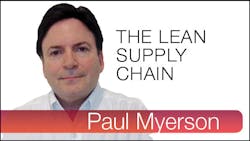Lean Supply Chain Strategies -- The Case for Outsourcing with Third (and Fourth) Party Logistics Providers
Logistics is often a candidate for outsourcing in a company as it may not be one of its “core competencies.” In many cases, a third party logistics provider or 3PL is used.
As you may already know, a 3PL is a business that provides outsourced (or "third party") logistics services to customers for part, or all of their supply chain management functions. 3PL’s typically offer integrated operation, warehousing, transportation and other value-added services and customize them to meet client’s needs based on the demands and delivery service requirements for their products.
In recent years, we have also started hearing the term “4PL” (fourth party logistics) providers, which are loosely defined as integrators that put together resources (including managing multiple 3PL’s), capabilities, and technology of its own organization and client organizations to design supply chain solutions. Conceptually, 4PL’s take on more risks than a 3PL by providing advanced IT and consulting services.
The typical benefits of a 3PL, which can provide a competitive advantage, include:
- Competitive advantage
- Greater flexibility
- Improved operational efficiency
- Enhanced customer service capabilities
- Reduction of capital expenditures (equipment, distribution centers.)
So it’s not hard to see why the use of 3 and 4PL’s can be a strategic part of a company’s Lean Supply Chain strategy.
A great example of this strategy is found in the article ‘Comprehensive Logistics Gets Cruze Contract” where, in 2010, Comprehensive Logistics Inc. was selected by General Motors Co. to manage global inbound logistics and value-added subassembly processes for the Chevrolet Cruze. “Under the agreement, CLI will receive parts and components from hundreds of global suppliers and build complex vehicle configurations for just-in-time delivery to the automaker’s assembly lines at the GM Lordstown Complex….[They] will manage inbound logistics, scheduling, storage and retrieval, metering, sequencing, kitting, returnable containers and outbound transportation for the Cruze line.”
In fact, many 3PL’s such as Menlo Logistics and Ryder Logistics tout their use of Lean principles in their own organizations when marketing their services.
For example, if you go to the Ryder Logistics website (www.ryder.com) you will see numerous case studies that show how they can help to optimize fleet and supply chain operations to improve customer service and increase profitability. Examples at their site include:
Andersen Windows - With Ryder On-Site Maintenance, trucks are running, shelves are stocked and customers are happy. Associated Grocers consistently hits extremely tight windows for a 99.5 percent on-time delivery rate.
Bendix - Transportation efficiencies saves Bendix $8 million in overall transportation and distribution costs.
Imperial Tobacco - Ryder helped this leading CPG manufacturer transform its supply chain and save nearly $3 million.
Milos Tea - Discover how this beverage company reduced miles traveled by 25% and distribution costs by 20%.
So, while your core competencies may vary by industry and individual company, I think it’s clear that any Lean supply chain strategy needs to at least consider, if not include, the use of 3 and 4PL providers.
About the Author
Paul Myerson Blog
Professor of Practice in Supply Chain Management
Paul's blog "Lean Supply Chain," has moved. You'll find his latest ideas and commentary on IndustryWeek's IdeaXchange.
You'll find more articles written by Paul at http://www.industryweek.com/blog/lean-supply-chain.
Paul Myerson is Professor of Practice in Supply Chain Management at Lehigh University. He is the author of a Lean Supply Chain & Logistics Management (McGraw-Hill, 2012), developer of a Windows-based supply chain planning software (www.psiplanner.com), and co-author of a lean supply chain and logistics management simulation training game by ENNA (www.enna.com).
